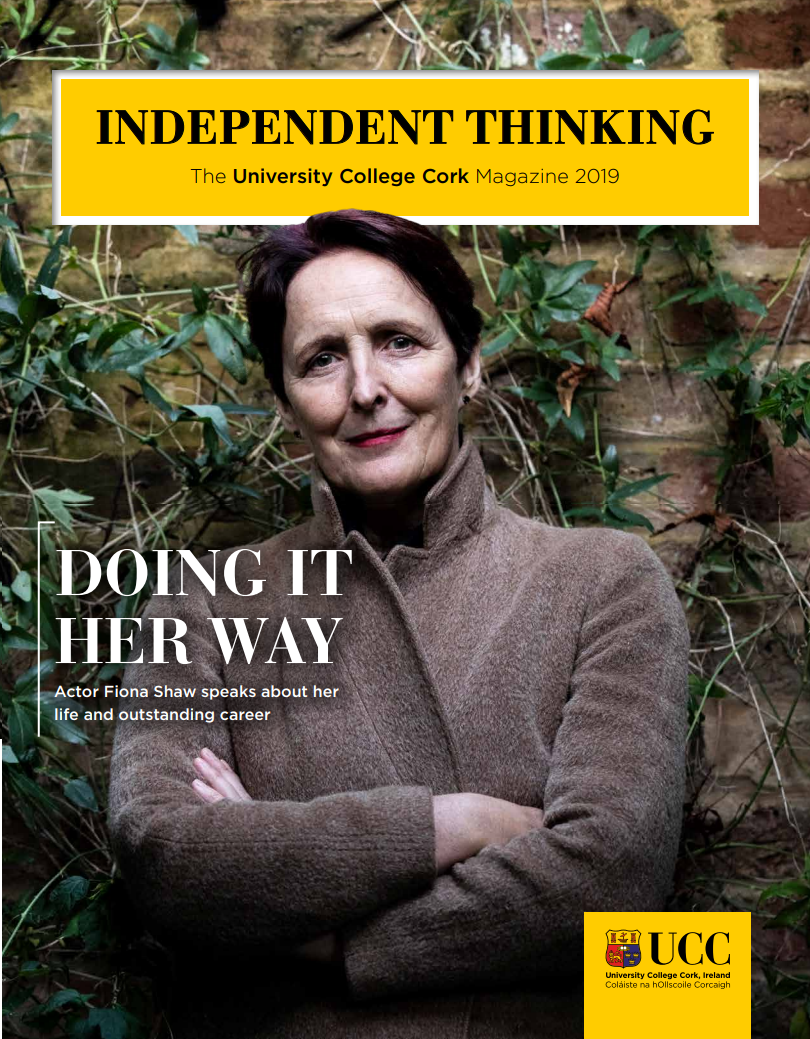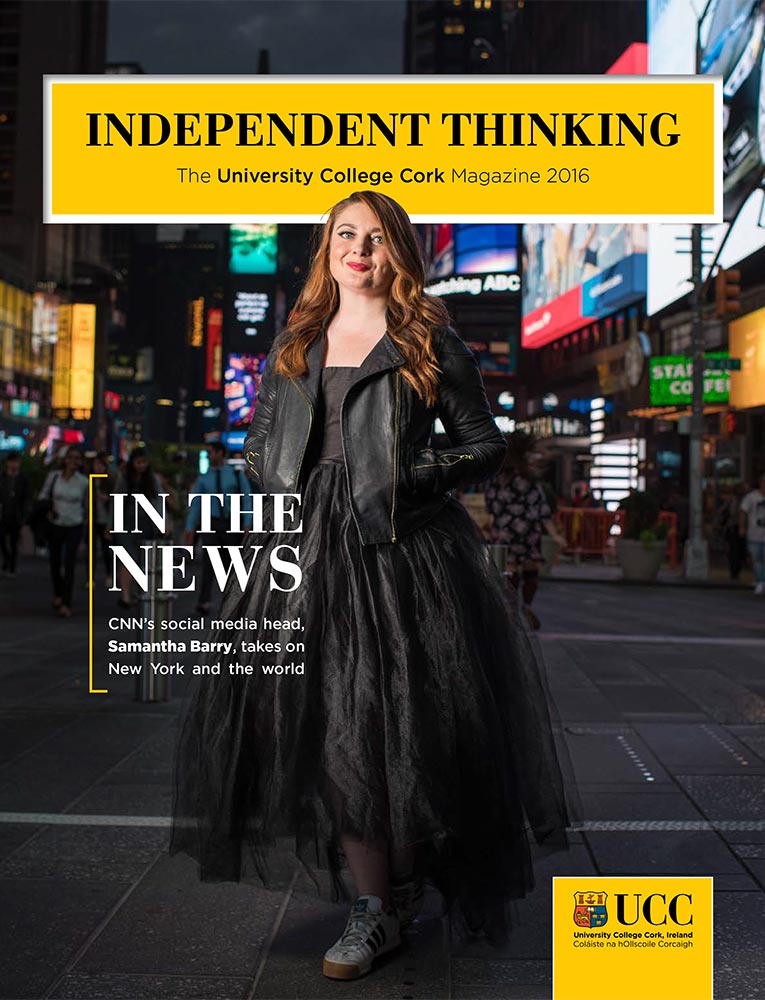Features
- UCC Springboard+: Kieran Egan
- UCC’s new Hub serves as ‘one-stop-shop’ service for 26,000 students
- Interview: Ryan Tubridy chats politics, history and his love of the arts on UCC visit
- UCC Emergency Care Society gets hands-on with life-saving skills
- Fitzgibbon Cup glory for UCC as hurlers beat IT Carlow in thrilling final
- GatewayUCC bridging the gap for research-entrepreneurs
- Pocket-sized brain injury monitor could be a game-changer for infant health
- Future of Irish hockey in safe hands with rising star Hannah
- Dr Eithne Hunt: Healthy habits for body and mind
- From Architecture to Web Development
- Nine APC Microbiome researchers make prestigious ‘highly cited’ list
- UCC honours five exceptional alumni at annual awards ceremony
- UCC spotlights four of its brightest up-and-coming female career scientists
- Rich Ferrie leads an exciting new era for UCC Innovation
- UCC honours its graduates with the official naming of the Alumni Bridge
- New UCC series explains how university research impacts daily life
- UCC's rising sports stars presented with scholarships
- UCC ranked among top universities in Europe for teaching excellence
Times Higher Education Europe Teaching Rankings 2019
- UCC makes Green Flag history…again!
The first university in the world to be awarded a fourth Green Flag
- Blazing a trail
Professor Helen Whelton charts her path to success, from curious dentistry student to global award-winner
- A Summer’s Evening on the Quad hits the right note for Cork charities
The fundraising event is now in its 14th year
- A curious mind
Paul Ross on his love of science, his greatest moments of discovery, and the exciting next chapter at APC Microbiome Ireland
- Mind your microbiome: 9 ways to boost your gut health
In honour of World Microbiome Day
- UCC hosts top wind energy experts at Cork’s largest ever conference
Scientists and engineers gathered to discuss the future of renewable energy
- Lord David Puttnam makes a passionate case for careers in the arts
He features in the latest episode of UCC’s podcast, Plain Speaking
- Funding announced for UCC SFI Research Centres
- Beekeeping makes life sweeter for Cork kids
- Saving Ireland's seals with GPS
- UCC celebrates a stellar year in sport
- Tommy Fleming headlines A Summer's Evening on the Quad
Tickets available now
- UCC ranked as global leader for sustainable social and economic impact
Times Higher Education University Impact Rankings
- Former UCC President Michael Murphy becomes first ever Irish President of EUA
Professor Murphy served as UCC President for 10 years
- MaREI researcher returns from epic adventure in search of blue whales
Dr Ailbhe Kavanagh spent seven weeks in Antarctica
- Doireann Ní Ghríofa among six new members elected to Aosdána at UCC ceremony
Writer Doireann is a UCC alumna
- Former White House drug advisor goes 'inside America’s opioid crisis'
Keith Humphreys is the latest guest on UCC's official podcast, Plain Speaking
- UCC launches Sports Strategy
Pride on our chest, belief in our heart, sport in our bones.
- How Nicole Ryan is powering change after tragedy
Alex’s Adventure
- Brainwave ‘donation’ research offers promise for dementia treatment
Research and innovation
- Full-circle for Paul as UCC extends partnership with Cork City FC
A perfect match
- Praise for The Irish Revolution as 'Atlas' documentary airs on RTÉ
Atlas of the Irish Revolution
- Pastures new
UCC launches its Food Institute
- Making waves at MaREI
Ireland's National Ocean Test Facility opens
- Research spotlight: APC Microbiome Ireland
10 researchers among Highly Cited
- Spin-out success
Atlantia Food Clinical Trials expanding stateside
- Billy Morgan: Pride of Cork
Marking a decade of UCC Sigerson Cup football
- The future is bright for soccer's Captain Fantastic
Ciara McNamara
- The next phase for rugby's rising star
Jack O'Sullivan
- RTÉ to air 'Atlas' documentary
The next step for the Atlas of the Irish Revolution
- Top business talent share their secrets to success
CUBS Conference 2019
- Green roots and flying boots: Cork Chamber project showcases ‘future’ of Cork
Future Forms is part of Cork Chamber’s 200th anniversary celebrations
- CEO and camogie star Mary O'Connor is leading change for women in sport
Moving the goalposts
- Mary Robinson is the first guest on UCC’s new podcast
Plain Speaking is now available to stream
Nine APC Microbiome researchers make prestigious ‘highly cited’ list
The Highly Cited list, compiled annually by the Web of Science Group, recognises researchers whose citation records place them at the highest levels of research influence
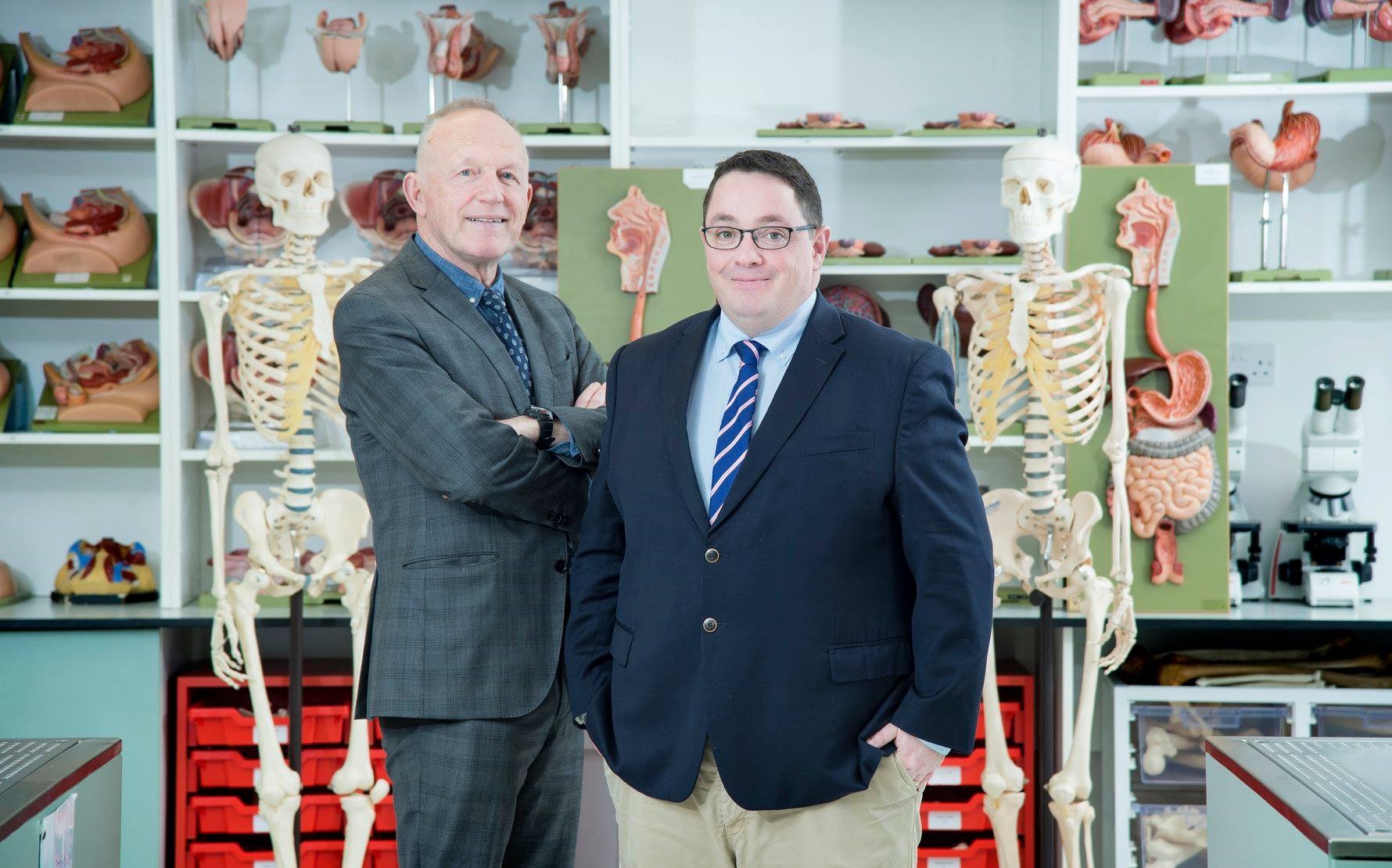
Nine researchers from one of UCC’s SFI Research Centres, APC Microbiome Ireland, have been named among the most influential researchers in the world.
Dr Gerard Clarke, Professor Paul Cotter, Professor John Cryan, Professor Ted Dinan, Professor Ger Fitzgerald, Professor Colin Hill, Professor Catherine Stanton, Professor Paul O’Toole, and Professor Paul Ross were all named among the most Highly Cited Researchers, according to the 2019 Web of Science List.
The Highly Cited Researchers list, which is compiled annually, recognises researchers whose citation records place them at the highest levels of research influence and impact. This year’s list includes 23 Nobel laureates, while a total of 29 researchers on the list are based in Ireland.
APC's listed researchers are all based in UCC and Teagasc, the Agriculture and Food Development Authority, while their areas of research are food, microbiome and health. You can find out more through this link.
Dr Gerard Clarke
Dr Clarke’s area of research spans stress and cognition in disorders such as depression and irritable bowel syndrome (IBS), the impact of the gut microbiome on brain and behaviour across the life span, and microbial regulation of tryptophan metabolism.
Professor Paul Cotter
Professor Cotter’s research focuses on the microbiology and microbiomes of food (especially fermented and other dairy foods), food processing and production environments, and the gastrointestinal tract; in the latter case, the focus is on maintaining/establishing a healthy gut microbiota through dietary interventions, including in athletes.
Professor Colin Hill
Professor Hill's research interests lie in understanding the role of the microbiome in disease. He is particularly interested in studying individual microbes, bacteriophages (bacterial viruses) and bacteriocins, to understand the forces shaping microbiome composition and to use that information to prevent and limit diseases of the gastrointestinal tract.
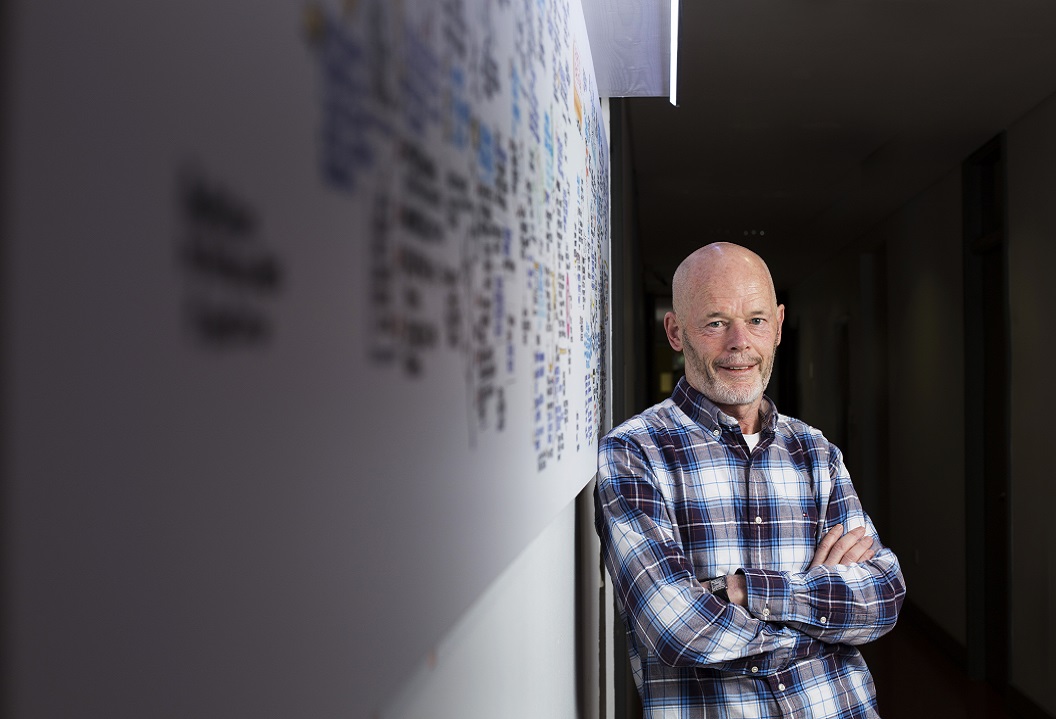
Professor John Cryan
Professor Cryan researches the neurobiological basis of stress-related neuropsychiatric disorders including depression, anxiety and drug dependence. His group is also focused on understanding the interaction between brain, gut and the gut microbiome and how it applies to stress and immune-related disorders, including irritable bowel syndrome, obesity and neurodevelopmental disorders such as autism spectrum disorder.
Professor Ted Dinan
Professor Dinan's area of interest is the role of the gut microbiota in influencing brain function and development. Within this context, he has focused on depression and irritable bowel syndrome.
Professor Catherine Stanton
Professor Stanton's research focuses on nutritional aspects of dairy and functional foods, probiotic cultures, bioactive metabolite production, infant gut microbiota, and healthy proteins and fats that are produced by gut bacteria. She is also very interested in the microbiome during pregnancy and in infancy.
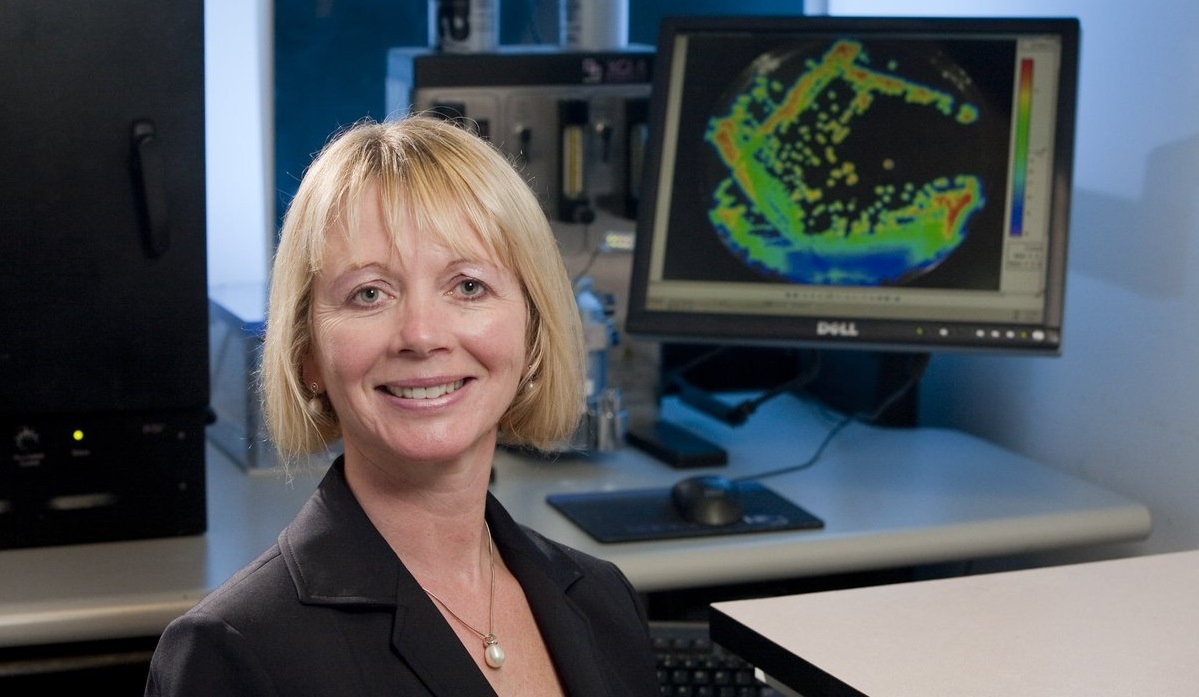
Professor Paul Ross
Professor Ross' research in food and health includes the development of new antibiotics and anti-infectives, bacteriophage (viruses that infect only bacterial cells), human and animal pathogens, and how the gut microbiota influences health.
Professor Ger Fitzgerald
Professor Fitzgerald's research focuses on the fundamental and applied aspects of the industrially important Lactic Acid Bacteria, which are used in the production of fermented foods and probiotics.
Professor Paul O’Toole
Professor O'Toole's research centres upon the genomics of gastrointestinal bacteria in humans, with emphasis on commensal species and host interaction. He is particularly interested in the relationships between the composition and function of the gut microbiota, its interaction with habitual diet, and its relationship to health, functional gastrointestinal disorders, and ageing.

